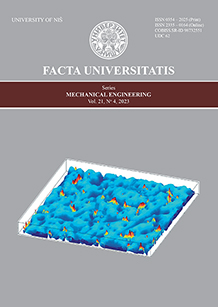A LOW-COST APPROACH TO DATA-DRIVEN FUZZY CONTROL OF SERVO SYSTEMS
IF 11.8
2区 工程技术
Q1 ENGINEERING, MECHANICAL
引用次数: 2
Abstract
Servo systems become more and more important in control systems applications in various fields as both separate control systems and actuators. Ensuring very good control system performance using few information on the servo system model (viewed as a controlled process) is a challenging task. Starting with authors’ results on data-driven model-free control, fuzzy control and the indirect model-free tuning of fuzzy controllers, this paper suggests a low-cost approach to the data-driven fuzzy control of servo systems. The data-driven fuzzy control approach consists of six steps: (i) open-loop data-driven system identification to produce the process model from input-output data expressed as the system step response, (ii) Proportional-Integral (PI) controller tuning using the Extended Symmetrical Optimum (ESO) method, (iii) PI controller parameters mapping onto parameters of Takagi-Sugeno PI-fuzzy controller in terms of the modal equivalence principle, (iv) closed-loop data-driven system identification, (v) PI controller tuning using the ESO method, (vi) PI controller parameters mapping onto parameters of Takagi-Sugeno PI-fuzzy controller. The steps (iv), (v) and (vi) are optional. The approach is applied to the position control of a nonlinear servo system. The experimental results obtained on laboratory equipment validate the approach.伺服系统数据驱动模糊控制的低成本方法
伺服系统作为独立的控制系统和执行器,在各个领域的控制系统应用中发挥着越来越重要的作用。使用伺服系统模型(视为受控过程)的少量信息来确保非常好的控制系统性能是一项具有挑战性的任务。本文从作者在数据驱动的无模型控制、模糊控制和模糊控制器的间接无模型整定等方面的研究成果出发,提出了一种低成本的伺服系统数据驱动模糊控制方法。数据驱动的模糊控制方法包括六个步骤:(i)开环数据驱动系统辨识,从表示为系统阶跃响应的输入输出数据中产生过程模型,(ii)使用扩展对称最优(ESO)方法对比例积分(PI)控制器进行整定,(iii) PI控制器参数根据模态等效原理映射到Takagi-Sugeno PI-模糊控制器的参数,(iv)闭环数据驱动系统辨识,(v)使用ESO方法对PI控制器进行整定,(vi) PI控制器参数映射到Takagi-Sugeno PI-模糊控制器参数。步骤(iv)、(v)和(vi)是可选的。将该方法应用于非线性伺服系统的位置控制。在实验室设备上的实验结果验证了该方法的有效性。
本文章由计算机程序翻译,如有差异,请以英文原文为准。
求助全文
约1分钟内获得全文
求助全文
来源期刊

Facta Universitatis-Series Mechanical Engineering
ENGINEERING, MECHANICAL-
CiteScore
14.40
自引率
2.50%
发文量
12
审稿时长
6 weeks
期刊介绍:
Facta Universitatis, Series: Mechanical Engineering (FU Mech Eng) is an open-access, peer-reviewed international journal published by the University of Niš in the Republic of Serbia. It publishes high-quality, refereed papers three times a year, encompassing original theoretical and/or practice-oriented research as well as extended versions of previously published conference papers. The journal's scope covers the entire spectrum of Mechanical Engineering. Papers undergo rigorous peer review to ensure originality, relevance, and readability, maintaining high publication standards while offering a timely, comprehensive, and balanced review process.
 求助内容:
求助内容: 应助结果提醒方式:
应助结果提醒方式:


